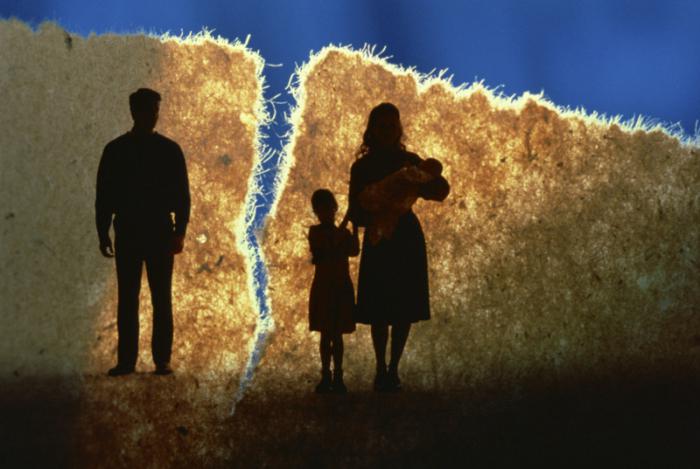Divorce of spouses is an unpleasant phenomenon in itself. After all, just recently you had a family, common Home and everyday life And suddenly everything changed. Where you once felt safe has become uncomfortable, and now you are wondering how to get a divorce. If you have a child, then you should approach this step responsibly. You can try to improve relationships in the family, at least for his sake, but if it is really difficult for you to live like this and it is difficult for you to turn a blind eye to what is happening, then it is better to dissolve the marriage.
It’s good when spouses come to a joint decision to divorce, calmly submit documents and gain freedom. But much more often there are cases when one of them does not want to consent to a divorce. And here various difficulties arise. You have to hire a lawyer who promises to help. But also the more difficult it is who have children. Many people do not know what to do and how to get a divorce if there is a child.
How to file for divorce
There are two ways to get a divorce these days: at the registry office and in court. If the spouses have no complaints against each other, there are no expensive purchases that they would like to share, there are no minor children who must stay with one of the parents, then it is enough to collect a minimum of documents and apply with them to the registry office. In a month you will be divorced. This is understandable, but where to get a divorce if there is a child or any property? In this case, you will have to collect a lot more documents and file a claim in court. A magistrate will hear the case. You are unlikely to be able to do without a lawyer.

Documents for divorce at the registry office
Before you collect Required documents for divorce, please take into account that the registry office will divorce you only with mutual consent or in some other exceptional cases. For example, if one of the spouses is officially considered missing, declared incompetent, or is in prison.
If this is your case, then prepare the following documents:
- Your general passport. It is necessary in both cases, regardless of where the spouses are divorcing.
- Pay the fee and be sure to take the receipt. Without it, divorce is impossible.
- Certificate that your marriage has been registered.
- A statement that you want to dissolve your marriage.
Documents for divorce through court
Those couples who cannot find a compromise have to resort to the help of the court. For example, many women often ask lawyers and jurists on various forums: I’m divorcing my husband, I have a child, what should I do and where should I go? Of course, go to court, even if the husband agrees to the divorce.

You will need:
- passport;
- marriage certificate - original only;
- birth certificates of your children - copies;
- a certificate of family composition, which confirms that you are providing for the children;
- You will need to pay the state fee and bring a receipt.
Non-standard cases
There are a variety of situations in life, so it is not surprising that some people have a question: how to file for divorce if, for example, one of the spouses lives in another city? In this case, the claim will be considered at the plaintiff’s place of residence if children live with him. But if they live with the defendant, then it will be necessary to send the request to the judge at the place of residence of the other spouse. If you are unable to go to court, you can write a statement asking that the case be considered without your participation.

Within about a month, you will receive an extract from the court decision, with which you need to go to the registry office and receive a divorce certificate.
What to do if you need to divide property
Cases of divorce proceedings when spouses want to divide property are quite common. After all, sometimes during family life husband and wife make very expensive purchases using joint funds. For example, they buy cars, apartments, dachas, land, open a business and much more. And no one is immune from the fact that literally in a couple of years all love will pass, but the accumulated property will remain, and neither party will want to voluntarily part with the benefits.
Divorce with division of property takes place only in court. In addition to the standard package of documents, the spouses will have to provide others: any documents that confirm that they have property and that they are the owners. In addition, there must be documentary evidence that the property to be divided has a certain value.

With cars and apartments, of course, the issue is resolved quickly. It is enough to bring title documents, where the cost of acquisitions will be indicated. But it also happens that spouses buy expensive furniture, equipment and other valuable property, which they then want to divide. Here you will have to look for purchase receipts and passports. Without these documents, property will not be divided. In any case, dealing with the division of property is much easier than the problem of how to get a divorce if there is a child.
The stronger sex in divorce proceedings
A man who has realized that he no longer wants to be with a woman naturally thinks: “That’s it, I’m divorcing my wife.” Have a baby? This means that this will not be easy to do.
According to statistics, which, by the way, are very rarely wrong, divorce is most often initiated by men, not women. But if the weaker sex almost always gets a divorce, then for men there are some cases when they cannot get a divorce for one reason or another. They are clearly defined by law, and in the cases below, a man is obliged to support his family, even if he has very good grounds for obtaining a divorce.
When a man can't get a divorce
For example, a man will not be able to obtain a divorce if his wife is pregnant at the time of filing the claim. It doesn’t matter what her term is and how long they were married. The court will not allow a divorce from a pregnant woman.

Also, a man who decides to end his marriage with his wife will not be able to get a positive decision in his favor in court if the family has children who are under one and a half years old.
Divorce! Who will the child stay with?
Divorce proceedings between spouses who have children is a special topic. Therefore, such cases are considered only in court, so as not to infringe on the interests of the child and to provide him with the best conditions.
So, we looked at how to get a divorce if there is a child, but who will he stay with? How does the court make a decision if, after a divorce, the parents no longer live together?
On the one hand, everything is simple here, but on the other, it’s not. It is possible that parents will independently make a decision regarding who their minor children will stay with, and after considering the claim, the court will most likely meet the parents halfway. Also, the wishes of the children (who they want to stay with) are always taken into account if they can already speak and consciously express their opinions.
Everything is much more complicated if one of the parents does not want to leave the children to the other. The judge will have to thoroughly familiarize himself with all the proposed documents, communicate with the parents, and only after that make his decision, always acting in the interests of the child.

Most often, children are left with their mother because she can provide the child with a more complete upbringing, but this does not mean that the father loses his rights.
Sometimes the court decides to leave the child with the father. This happens when the mother is declared incompetent, cannot support children, or has an alcohol or drug addiction.
The court refused the divorce. Causes
Yes, it’s not always possible for people to get divorced. Sometimes, due to minor shortcomings or inattention of spouses, the court refuses to divorce them.
This usually happens because all necessary documents. Or significant errors were made in writing the statement of claim.
It happens that, out of ignorance, spouses apply to the court, although they can do this at the registry office. Then the court sends them there, naturally refusing a divorce.
Another common reason for refusal is that the application to the court was filed by a third party who has no rights to do so. Or the spouses simply changed their minds about getting a divorce, and therefore withdrew their application even before the court hearing took place.
If before the start of the trial the plaintiff manages to correct the shortcomings, then the process continues, but if not, then the documents are returned, and the spouses will again have to collect all the papers again and set a date.
When married couple, who decided to leave, the common one grows up Small child, then the divorce procedure will have its own nuances.
How to file a divorce from your husband if you have children? Read more about this in our material.
Dear readers! Our articles talk about typical solutions legal issues, but each case is unique.
If you want to know how to solve exactly your problem - contact the online consultant form on the right. It's fast and free!
Let's consider. If there are minor children in the family, divorce is almost always (with the exception of 3 cases) legally formalized in court.
In this situation, filing a claim has its own nuances.
So, it should definitely mention common children, indicating their full initials and exact date birth.
In addition, the claim should indicate wishes regarding and changing their surname. At the same time, they must be supported by convincing arguments that it would be better for the children to live with this particular parent.
As practice shows, wanting to protect the interests of children, the judge always gives their parents a certain period for reconciliation.
Its duration is 3 months. And only after their expiration, the court again returns to the topic of divorce and makes a final decision.
However, regardless of whether children are raised in the family or not, a court decision on divorce alone will not be enough. After some time, each spouse will have to issue an official confirmation of divorce at the registry office. The state fee for such a legal action is 650 rubles, and both the ex-husband and the ex-wife must pay it.
In addition, if, as a result of a divorce, the initials of a small child have also changed, you should promptly make the appropriate adjustments to his birth certificate.
Divorce at the registry office
Today there are three exceptions to the rule, when, regardless of the age of joint children and their number. All of them are related to the existence of a corresponding court decision in relation to the second spouse.
 It may concern:
It may concern:
- officially declaring another family member as missing;
- recognition of the husband (wife) as completely incompetent.
In addition, if the second spouse is involved in a crime, and the court sentenced him to serve a sentence of 3 or more years in prison, then this may also be the basis for filing a divorce through the registry office.
To terminate a marriage under such a simplified procedure, it is enough to write an application yourself and provide your personal passport, marriage certificate, as well as a copy of the court decision on the second spouse. From a financial point of view, this form of divorce will cost 350 rubles. This is a state duty, the amount of which is prescribed in the Tax Code of the Russian Federation. Please note that you can choose to submit documents either to the registry office that registered the marriage or to the institution at the applicant’s place of residence.
When a child reaches adulthood, his parents can also divorce each other at the registry office. Naturally, both parents should not mind ending the relationship.
If we talk about the time during which such a procedure lasts, then it is approximately one month. After which the initiator of the divorce is given a certificate of termination of marriage, and he becomes completely free from marital ties.
Separation of children in divorce
 Many women wonder:
Many women wonder:
The divorce procedure (we emphasize, in court) can be affected by the age of growing children, as well as their state of health.
So, if the child is not yet a year old, then his father cannot initiate divorce proceedings himself (of course, if the wife herself does not oppose such a step).
When a divorce occurs in a family where the child has not yet reached the age of three or was born disabled, alimony is awarded both in favor of the child and his mother. And if the baby is healthy, then after he turns 3 years old, as a rule, they stop. It’s another matter when the child is disabled from childhood with group 1. In this case, the mother can count on alimony until such a child reaches adulthood.
In a divorce situation between spouses who have two or more children, alimony for their maintenance is awarded in an increased amount. Let us remind you that this is a third of the income, and 3 or more is half.
Today the legislation does not have clear rules determining how children should be distributed between former parents in case of their divorce. If the spouses have entered into an agreement between themselves, which we discussed above, then its norms in most cases are a priority for the court.
In other cases, the court makes a decision based on:
- the standard of living of each parent, their income and housing provision;
- the presence or absence of bad habits among spouses;
- personal attachment of children to mother or father;
- the opinions of the children themselves, if they are already 10 years old.
Often your wishes about later life Children can be advised by the guardianship and trusteeship service. She has the right to conduct a preliminary examination of the conditions in which the children are likely to continue to be kept. Then an appropriate conclusion is drawn up, which the court can also take into account.
So, let's summarize. If a divorce occurs in a family with children, then you should almost always resort to the help of the court. Moreover, in such a situation, the court must decide whole line additional questions regarding the payment of alimony, further residence of children, etc.
Divorce between spouses who have joint minor children is the exclusive prerogative of the court. This rule is enshrined in Article 21 of the Family Code.
Exclusively judicial procedure The dissolution of such marriages is associated with the increased attention of the state to the fate of minors who, due to their age, cannot do without guardianship and material support from their parents (adoptive parents). Related to this are the restrictions imposed by law on divorce from a husband if the woman has children. Although, in to a greater extent, restrictions apply to men.
When women have questions about how to divorce their husband if there is a child, they should remember the following restrictions and the special procedure for collecting and presenting evidence to the court.
Who can initiate a divorce?
 The Family Code does not impose restrictions on the expression of the will of spouses when deciding to divorce. Therefore, if there are children, a woman or a man can initiate a divorce from her husband, or the decision on the advisability of a divorce will be made by them jointly.
The Family Code does not impose restrictions on the expression of the will of spouses when deciding to divorce. Therefore, if there are children, a woman or a man can initiate a divorce from her husband, or the decision on the advisability of a divorce will be made by them jointly.
But, there is a limitation due to the wife’s pregnancy or the presence of a child under 1 year of age.
During this period, there is a moratorium on accepting applications from men wishing to divorce before the child turns 1 year old.
This provision does not require any special explanation. During pregnancy and the first year of caring for a child, a woman needs increased attention from loved ones and relatives. She temporarily loses her ability to work and, in most cases, cannot independently provide herself and her newborn with the means necessary to maintain a normal standard of living.
This is precisely why men are prohibited from initiating a divorce at their request.
The spouse will have to come to terms with the current situation and wait until the newborn reaches one year of age.
A woman in the described situation is more free in her actions. The law does not prohibit her from initiating a divorce at any stage of family life, regardless of whether she is pregnant at the time of filing the application or is on maternity leave. At the same time, the age of the newborn also does not have any influence on the acceptance of a divorce application for consideration in court.
Rules for filing divorce applications
The only case when the court can accept and consider an application for divorce from spouses who have a child under the age of 1 year or when the spouse is pregnant is a joint filing of an application to the court, in which both husband and wife clearly and unequivocally express their desire to end the marriage relationship .
A special case is when only the spouse submits an application, but at the same time he attaches to the application the written consent of the spouse for divorce.
In other cases - when the wife does not agree to the divorce, or does not express her attitude towards the husband’s initiative, the court refuses to accept the application from the man.
In the event that the initiator of the divorce is a woman, in addition to the application and the following documents: 
Must provide the court with a certificate from a medical institution (antenatal clinic) about the duration of pregnancy, and in the case of the birth of a child, a birth certificate, which will determine the age of the newborn.
Involvement of guardianship authorities in the process
Considering the vulnerability of the child and the possible inappropriate behavior of the parents during the period of aggravation of interpersonal relations on the eve of the divorce, the participation of a representative of the guardianship and trusteeship authorities may be required in the divorce process.
His participation is appropriate in the following cases:
- When the initiator of divorce is the spouse;
- When, simultaneously with filing a claim for divorce, a claim for division of property is filed as a result of which the property rights of the child may be affected;
- If a petition has been filed against one or both divorcing parents to deprive or restrict parental rights;
- If there is a dispute about the whereabouts of the child after the divorce.
It is the guardianship authorities, acting in court to protect the interests of the minor, who give binding conclusions on the possibility of dividing property (its sale) or determine with which of the divorcing parents it is more appropriate to leave the child.
Alimony between spouses during divorce
The RF IC establishes that parental support obligations apply not only to children (adopted) but also to former spouses:
- A wife who is pregnant;
- An ex-wife who is on maternity leave for a child under 3 years old.
Wherein ex-spouse is obliged to pay alimony not only for the maintenance of a common child (children) but also for the maintenance of the ex-wife during the period of her forced disability.
If child support can be determined
- In equity (in relation to income);
- Fixed;
- Combined form.
- Or paid in a lump sum.
Alimony for the maintenance of a woman caring for a minor child under 3 years of age is always assigned as a fixed amount. Its size corresponds to the established organs local authorities living wage.
To receive content from ex-husband A woman must, simultaneously with the application for divorce or after the divorce, submit an application to the court for payment of maintenance.
When can you get a divorce based on the consent of the second spouse?
There are exceptions to the restrictions imposed by law on divorce from a pregnant wife or who is raising children under 3 years of age:
A husband can file for divorce without his wife's consent if:
- She was declared incompetent by the court due to mental illness or alcohol (drug) abuse;
- Deprived of parental rights;
- Sentenced to imprisonment for a term of more than 3 years.
In this case, it is sufficient to attach the corresponding decision (sentence) of the court that has entered into legal force.
Divorce under these circumstances is possible on the initiative of either spouse, and it is formalized not in court, but by the civil registry office at the place of residence of the spouse filing the application.
Determining the child’s place of residence
 During a divorce, the question of the place of residence of a child under 3 years of age is usually not raised. Due to physiological characteristics: acute need for constant care, breastfeeding newborns and young children usually remain with their mother.
During a divorce, the question of the place of residence of a child under 3 years of age is usually not raised. Due to physiological characteristics: acute need for constant care, breastfeeding newborns and young children usually remain with their mother.
There are rare exceptions when the court decides to transfer such a child to be raised by his father.
This is usually due to the same reasons why divorce is possible in the registry office without the consent of the second spouse. But situations may arise when the child’s father will be able to prove the danger of the child being with the mother due to her antisocial behavior, lack of proper child care, cruelty or leaving the child’s health and life in danger.
There may also be a lack of permanent residence for the ex-wife after a divorce. In these cases, the court proceeds not so much from the interests of the mother, but rather from the interests of the young child. If the ex-husband is provided with housing and has a stable income, and the mother has neither one nor the other, the court decides to transfer the child to the father until the mother arranges her life and finds a source of livelihood in the form of a stable income.
Time limits for consideration of an application for divorce
For spouses with joint minor children, the general procedural deadlines established by Art. Art. 21-23 RF IC.
Regardless of the consent or objection of one of the spouses, the hearing of the case is scheduled no earlier than 1 month after filing the application with the court. In this case, the judge, on his own initiative, can extend the period assigned for reconciliation of the spouses to 3 months.
During this period of time, changes may occur that affect the court's decision:
- A child will be born;
- Reach 1 year of age.
In these cases, the moratorium on the husband filing an application ceases to apply.
The child may reach the age of 3 years - in this case, the woman is deprived of the right to receive alimony for her maintenance from her ex-spouse.
A marriage is considered dissolved from the time the court decision enters into legal force. This occurs after the time given to the parties to appeal the court decision has expired. - 10 days.
After this, the spouses can receive divorce certificates.
Divorce of actual marriages
Often people live together, run a common household, have common children, but do not formalize their relationship with the registry office. Or they formalize marriage relations in accordance with local (national) customs or religious rituals. In these cases, they should remember that no form of marriage other than one registered in the registry office is legal. It does not entail any legal consequences for people who decide to separate. In this case, the state of pregnancy or the age of the child under 1 year also does not play any significance.
A woman, in the event of termination of cohabitation, has no right to demand alimony from her former partner.
The only ones who do not suffer in any way when parents separate are the children. Regardless of the form of marriage between parents, they have the right to recognition of paternity (maternity), the first and last name of one of the parents, and alimony from a parent who does not live together until they reach the age of 18.
Which he perceives more acutely than the parents themselves. When talking to a child, you need to be extremely careful. No need to say that any of the parents are bad, no. It is necessary to show your child in this situation positive side: talk about how he will go to the pool with his mother, and go to the sea with his father, for example. That is, do not shift the blame onto each other, but let him understand that everyone loves him just the same, and every parent needs him just as much. Parting is a little scary for a couple when they are faced with the question of how to get a divorce if there is a child. Of course, if there were no children in the marriage, everything is reduced to a minimum. That is, the couple comes to the registry office and writes a statement there. They are given a divorce form. But if there are children in the family, the divorce process goes through the court.
 How to file for divorce if you have a minor child?
How to file for divorce if you have a minor child?
When writing an application, you must indicate that you have been married since such and such a time, and you have a child together. If you and your husband decide that your son or daughter will stay with you or him, this will also need to be noted in this document. In this case, the court will take into account the wishes of the child. He will be asked about who he wants to stay with if he is ten years old. If one of the spouses is against breaking up the relationship, the judge will give time to think about the situation. And if after the expiration of the proposed time the decision has not changed, the couple will be divorced. In the interests of the minor, the issue of financial support for the child will be raised. Cash payments can be negotiated peacefully or filed
 with my husband, if there are children
with my husband, if there are children
When there are several children in a family, the divorce procedure remains the same. Perhaps the couple decided to separate their sisters and brothers. Then this point must also be stated in the application. The court will also take into account the children's opinions. Weigh the pros and cons of such a decision. Couple can't share children? The court will take over this function. His decision will now be final.
How to get a divorce if you have a child, but the father is not listed on the birth certificate
The registry office will also help you with this question, of course, if you have no desire to divide the property. But if the spouse is against divorce, then he will need to establish the fact of paternity and obtain the appropriate certificate. And also fight for the child to stay with him. Of course, before going to court, the spouses should discuss everything without hysterics and also ask their child about this, so as not to “wash dirty linen in public” at the hearing.
How to get a divorce if there is a child, and the father or mother is in prison or declared missing?
This can be done both through the registry office and through the court. It is enough to submit an application and state the essence of the matter. This one won't take long. By the way, you can also apply for alimony if the defendant is in prison.
How to get a divorce if you have an adopted child
The divorce procedure will be exactly the same as if the child were your own. When an adoption occurs, the judge focuses on what the parents will bear for this minor full responsibility as biological mother and father. Those. the son or daughter will be the successors of their property and have the right to development and education by both parents.
Dear parents, take care of your children! We ourselves prepare the ground for how they will grow up and how they will treat us.
According to statistics, the vast majority of children are abandoned by their mothers, but sometimes it makes sense to play it safe and prepare evidence in your favor.
Where does a divorce from a husband occur if there are children?
When divorcing a husband, there is three instances, which you can contact to carry out this procedure : civil registry office, magistrate, district court.
Civil registry offices
Quite a convenient option, its plus is that there is no need to obtain the husband’s consent for divorce, even if there are common minor children, and the terms are much shorter. Minus is that the use of this option is possible only in a limited number of cases: under Art. 19 of the Family Code (FC) of the Russian Federation, divorce can be effected through the registry office at the request of even one spouse if:
- Your husband is recognized missing through the court.
- The court recognized your husband incompetent.
- The wife was sent to prison for more than 3 years.
It is important to note that only a spouse who does not belong to such categories can apply to the registry office with such an application. The application is submitted at the place of residence of one of the spouses or at the place of marriage registration, which is quite convenient.
The application will need to be accompanied by: a document confirming your identity; Marriage certificate; a court decision confirming your right to divorce through the registry office (a court verdict convicting your husband for more than 3 years is not suspended, a court decision declaring your husband missing or incompetent), a receipt for payment of the state duty.
Review period will be 1 month. This time is used to notify interested parties (guardians or managers of the husband’s property or himself in prison), and the establishment of a one-month period is aimed at ensuring that there is an opportunity to change one’s mind and comprehend everything. Upon expiration of the period, the marriage is dissolved and you can receive.
World judge
Anatoly P. and Veronica N. got married in 2004, they have common children aged 8 and 9 years. As a result of the discord in the relationship, Anatoly P. decided to get a divorce, to which his wife agreed. Even before the trial, they resolved the issue of dividing jointly acquired property and alimony, and also determined that the common children would live with their mother. When the trial began, the husband changed his mind about leaving the children with his wife and filed claims for the children. As a result, the case was not within the jurisdiction of the magistrate. The judge made a ruling and referred the case to the district court, where the case was resolved in favor of the wife.
The procedure for divorcing a husband if there are children
After you have filed a claim in court, you must wait for notification of the time and place of consideration. As a rule, it arrives 10-16 days from the day the claim was filed.
- If there is still no notification during this time, then it is worth going to court and finding out the reasons for this (sometimes the application is left without progress).
- If everything is in order with the claim, in 1 month there will be a trial (the period is counted from the date of filing the application).
You can either personally participate in the meeting or send a petition so that the case is considered without you. The defendant has the right to file an objection to the claim or admit it.
- It is important to note that it is impossible to dissolve a marriage if the wife is pregnant or has child under 1 year, the same applies to the death or loss of a child within the specified period.
- There are a number of features and if available child under 3 years old. Before the child is 3 years old, the woman remains on maternity leave and, accordingly, has no opportunity to earn money, which gives rise to the husband’s obligation to pay alimony not only for the child but also for the spouse while she is on maternity leave.
- A similar rule exists for disabled child(group 1 from childhood), but in this case, you need to pay alimony to the wife caring for this child until he comes of age.
If there is a dispute about children, the process may drag on for a period of 1 to 3 months. This is due to the fact that you need to determine who to leave the child with, find out the arguments of the spouses and the child himself (if he over 10 years old). A psychological examination of the child is often necessary (it is used to determine the degree of attachment to each parent).
There are frequent cases of involvement in legal proceedings guardianship and trusteeship authorities. They examine the living conditions of the husband and wife, find out whether their home meets the standards and whether it is possible for children to live here. The court will take this examination into account when resolving the dispute.
If the spouses have reached a compromise about the fate of the children, they can enter into a settlement agreement. It indicates the place of residence of the child after the divorce, and may additionally stipulate the issue of alimony, the procedure for communicating with the child, and others. However, the court may not approve the agreement if it considers that it is contrary to the interests of the children.
Semenov V.A. in 2012 he went to court with a demand to dissolve his marriage with Semenova E.V. At the same time, they had two twin children, each of them was 12 years old. Each of the parents was attached to their children and wanted to live with them. During the trial, the Semenovs were able to reach an agreement among themselves and decided that each would take one of the children. A settlement agreement was drawn up regarding this. During the process, the children stated that they did not want to live separately. The court decided to refuse to approve the settlement agreement and ordered a psychological examination, which confirmed the harm of separating the twins and established that their psychological attachment to their mother is stronger. Based on this, the court decided to leave the children with their mother.
If there is no unanimity in the decision on who to leave the child with, the court itself will make a decision. The judge will take into account the personal qualities of the spouses, their income, health, living conditions, the child’s affection and other facts.
The court must find out whether the defendant gives consent to termination. If there is one, then the divorce process will speed up. But if the defendant is in favor of preserving the family, the judge must find out the reasons for the divorce and determine whether preservation is possible family relations. In addition, the judge may give reconciliation period up to 3 months. If the plaintiff does not give up his idea, the claim is satisfied and the marriage is dissolved.
The court's decision in this case will come into force after 1 month; in case of an appeal, the decision will come into force after the case is considered by the court of appeal. Then you need to contact the registry office, which will issue you a certificate of divorce.
Application to court for divorce
A statement of claim for divorce is filed in a magistrate or district court. It may be drawn up by the plaintiff himself, but also good option will contacting a lawyer or a family law lawyer.
Other demands can be added to the claim for divorce (about alimony for children or wife, about determining the place of residence and the order of communication with the child, about the division of jointly acquired property).
It is important to note that when combining claims, it is possible to change the jurisdiction and increase the period for resolving the dispute. Separate consideration of each issue will also allow you to concentrate more on problems and solve them more effectively.
The application itself is submitted at the place of residence (registration) of the husband or the last known one. But there are a number of cases in which an application can be submitted at the place of registration of the plaintiff:
- If you are raising children who have not reached the age of majority and live with you.
- Serious health problems of the plaintiff.
- Consent of both spouses.
Exists a number of requirements to the statement of claim, it must contain:
- Details of the district court or magistrate.
- Addresses (both actual and official), telephones, e-mails of spouses.
- Information about marriage (date and place).
- Termination date life together.
- Information about children and the existence of a dispute about them.
- The presence of the husband's consent to divorce.
- Reasons for divorce.
- The very demand for divorce.
- Requirements for division of property (if any).
- Child support requirements (if any).
- List of attached documents.
- Date and your signature.
Must be attached to the statement of claim:
- A copy and original of the marriage certificate (its conclusion). If it is missing, you need to contact the registry office where the marriage was registered so that you can be issued a duplicate certificate.
- A copy and original of the child's birth certificate.
- A receipt that confirms that the state fee has been paid.
- If the spouses want to divorce, a written consent to divorce is required, which must be certified by a notary.
- Information about the income of family members and documents confirming them (if there is a dispute about alimony).
- If the husband and wife have decided on the amount of alimony, then an agreement on it certified by a notary.
- Marriage agreement (contract), if any.
- Inventory of property and documents for its assessment, in case of a dispute about property.
- other documents relevant to the case.
The package of documents must be as complete as possible, in this case the case is processed without delay and much faster. If something is missing, the judge has the right not to proceed with the case, of which the plaintiff will be notified. The court will provide time to correct the shortcomings. If the plaintiff does not meet the deadline, the application and all attached documents will be returned to him.
State fee for divorce in court
When you divorce your husband, the law requires you to pay a state fee. In case of divorce through the court (without division of property), you will have to pay a state fee 650 rubles for filing a claim.
It is important to note that even during a trial, it is necessary to pay the state fee to the civil registry office, i.e. another 650 rubles for each copy of the divorce certificate. Which adds up to 1950, and this does not include the cost of hired lawyers.
When dividing joint property, in addition to the standard fee, you must additionally pay for the division of property and this amount will depend on the total value of your property.
The minimum state duty for the division of property will be 400 rubles, but in general it will be calculated using the following formula:
- within 20,000 rubles - 4% of the claim price, but at least 400 rubles;
- 20,001 - 100,000 rubles - 800 rubles + 3% of the claim price exceeding 20,000 rubles;
- 100,001 - 200,000 rubles - 3,200 rubles + 2% of the claim price exceeding 100,000 rubles;
- 200,001 - 1,000,000 rubles - 5,200 rubles + 1% of the claim price exceeding 200,000 rubles;
- more than 1,000,000 rubles - 13,200 rubles + 0.5% of the claim price exceeding 1,000,000 rubles, but the total amount does not exceed 60,000 rubles. Those. you will not pay more than this amount even if the value of the assets is more than a billion rubles
Family T. After 10 years of marriage they decided to get a divorce. They have common child aged 5 years, apartment ( market price which is 800,000 rubles), a bank account in the amount of 200,000 rubles and a LADA Kalina car (valued at 150,000 rubles). IN in this case The state fee when filing a claim will be 19,600 rubles = 650 rubles + 13,200 rubles + (800,000+ 200,000 + 150,000)* 0.5%.
The issue of paying the state fee is very important; without paying it, the judge can leave the application without action, and in case of non-payment, will return your application and your documents.
In this case, it is possible to defer or installment payment of the state duty, as well as reduce it taking into account the property status of the wife (plaintiff). As a rule, judges are ready to accommodate a woman who does not work and is raising children. To confirm her position, the wife should provide certificates of income, the presence of dependents and other documents confirming expenses and the impossibility of timely and full payment of the state fee.
Can a child stay with his father after a divorce?
Statistics in Russia say that children are abandoned with the father only in 5% of cases. This is due to mentality and the fact that, as a rule, the child’s psychological and emotional attachment to his mother is greater.
But there are also opposite cases. To ensure that the child remains with the mother necessary:
- Do not sign documents agreeing that the child will live with the father.
- Get it from the guardianship and trusteeship authority conclusions, which says that it is preferable for the child to live with the mother
- Bring income certificates and their regularity, confirm the possibility of providing for the child necessary things(clothing, treatment, food, training, entertainment)
- Present positive things from your place of work recommendations and characteristics;
- Bring to your advantage the fact that other relatives (grandparents, aunts, uncles, etc.) will help in upbringing;
- Find out your child's point of view (if he has reached 10 years old, the court will ask his opinion). The desire to live with mom is a powerful argument
- Present arguments that compromise the father before the court. (drink and drug abuse, bad habits, serious illness, lack of housing, etc.). In this case, evidence is needed that will convince the court that you are not slandering.
It is important to present to the court proof that will convince him that you are right:
- Testimony from the mother herself with convincing arguments;
- Documentary evidence from the place of work or from government agencies;
- Witness statements;
- Forensic psychological examination;
- conclusions of guardianship authorities;
- income documents;
- documents indicating the degree of participation in the lives of children;
- video shooting, photographs.
Based on this, the court will decide with whom to leave the child. If the mother manages to collect all these documents and evidence, then the likelihood that the court will give the child to the father is extremely small.
Questions from our readers and answers from a consultant
My husband decided to get a divorce and filed statement of claim about divorce. At the same time, he indicated that we agreed to get a divorce and were not ready to try to save the family. In fact, I am against this. Plus, we have a child together. What should be included in an objection to a claim?
In your objection, you must indicate in detail the reasons for not wanting a divorce and point out the possibility of preserving the family, while it is good to refer to the presence of a common child and his interests. In this case, the court may give you 3 months for reconciliation.
Do I need to have copies of the statement of claim certified by a notary if I send them to another city where the defendant lives?
No, the statement of claim is not certified by anyone, it is only necessary to draw it up correctly and include the date and your signature.
I am divorcing my husband, we have three children (4, 6 and 8 years old). I would like to know what the differences will be from a divorce if there is one child.
In fact, the differences are not so significant. The amount of alimony will vary: one child is entitled to one-fourth of earnings or income, and for three children it is already half.